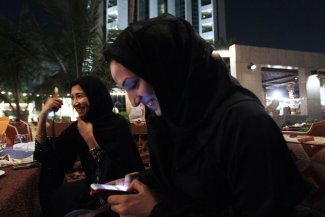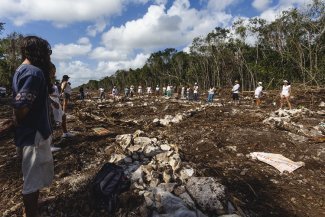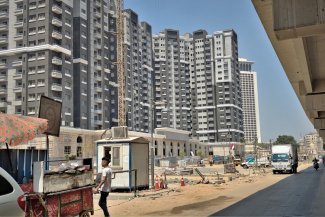Saudi Crown Prince Mohammed bin Salman (right) receives Sultan Haitham of Oman, for a tour at the Neom Centre for Knowledge Enrichment, in Neom, Saudi Arabia, on 11 July 2021.
News that a Saudi court has sentenced three members of the Huwaitat tribe to death for opposing eviction to enable the construction of a controversial desert ‘giga-project’ has been met with outrage from human rights groups, who have described the verdict as “extremely shocking”.
According to a report by ALQST, a London-based NGO that works to defend human rights in Saudi Arabia, Shadli al-Huwaiti, Ibrahim al-Huwaiti and Ataullah al-Huwaiti were convicted on 2 October 2022 by Saudi Arabia’s Specialised Criminal Court for organising resistance to the eviction of local people in Tabuk Province, north-western Saudi Arabia to make way for Neom, a US$500 billion futuristic development that is currently under construction.
The contentious project – the centrepiece of which is set to be a 170-kilometre, ‘smart and sustainable’ mirrored megacity known as The Line – has been strongly supported by Crown Prince Mohammed bin Salman (also known as MBS) under the Kingdom’s Vision 2030, a blueprint to usher in social transformation and steer the petrostate away from oil, supposedly towards a more sustainable economy.
However, Saudi authorities have sought to clear areas in Tabuk of its inhabitants, most of whom belong to the ancient, nomadic Huwaitat tribe, which has been settled in the area for centuries, as well as in areas of Jordan and the Sinai in Egypt. It is estimated that some 20,000 Huwaitat people face eviction from Tabuk to make way for Neom, although the true figure could be much higher as a lack of transparency and a total absence of local human rights organisations makes accurate data impossible to obtain.
Lina Alhathloul, a prominent Saudi activist and the head of monitoring and communications at ALQST, qualified the verdict as “extremely shocking”. She tells Equal Times: “It speaks volumes about the project, how it’s being built on people’s blood.
” She describes Neom as a “one man show with no respect for basic human rights,” referring to MBS, who is known for his ominous human rights record marked by mass arrests and a surge in executions since his ascent to power in 2017, as well as his alleged links to the gruesome killing of the Saudi journalist Jamal Khashoggi.
ALQST firmly rejected the death sentences and the use of the death penalty, calling for the immediate, unconditional release of the convicted men. Its calls have been supported by other rights groups.
“These sentences are one step further taken by the Saudi kingdom to tell citizens that anyone who dares to express public criticism of the government should be silenced, otherwise they will face decades in prison or even the death penalty,” says Duaa Dhainy, a researcher and caseworker at the European Saudi Organization for Human Rights (ESOHR).
A five-year nightmare – and it’s getting worse
The idea of Neom was first launched by the Crown Prince in October 2017, when plans for a ‘city of the future’ were backed with promises to bring progress to the historically underdeveloped area in Saudi Arabia’s north-west coast.
According to the Justice for Victims of Neom campaign, promotional videos released by Neom falsely claimed that the project would be built on virgin land. However, “the Huwaitat tribe have been living on various tracts of that land for hundreds of years. The Huwaitat people are not against the building of the city, however they have a right and desire to be included in its construction and to benefit from the use of their ancestral lands. Unfortunately, despite many promises, this has not happened,” says the campaign group.
In 2020, government officials charged with securing land in Tabuk for the project reportedly began offering locals compensation money of between €27,000 and €265,000 for their land, although some reports detail compensation offers of as little as €3,000, which is well-below market value. After people refused to move, security forces unleased a campaign of threats, harassment, abductions, forced displacement and even armed force.
“Having locals sentenced because they refused to be expelled from their own homes and excluding them from any real discussion about building a city on their land tells us that the plan wasn’t envisioned for the community from the start,” says Alhathloul.
Shadli al-Huwaiti is the brother of Abdul Rahim al-Huwaiti, who was shot dead by Saudi special forces in April 2020 after protesting in videos regularly posted on YouTube against the government’s displacement of Tabuk residents. Shadli, who is also well-known on social media, went on hunger strike in late May 2022 to protest his ill-treatment in detention, including being placed in solitary confinement; two weeks later he was force-fed by the Dhahban prison administration.
Ibrahim al-Huwaiti was part of a delegation of local residents who met in 2020 with government officials charged with securing land for the Neom plan, while Atallah al-Huwaiti has been seen in a number of videos denouncing the plight of this family and of all the other displaced residents.
Their sentencing comes hot on the heels of an escalating campaign by the Saudi authorities to drive the Huwaitat completely out from their land. Since December 2021, members of the Huwaitat that remain in Tabuk have reported increasing pressure exerted by the authorities, consisting of actions such as unannounced cutting off of water and electricity supplies, the use of aerial surveillance drones above residences, and the close monitoring of mobile phone and social media accounts. In September, Middle East Eye reported that to date, 150 Huwaitat tribespeople have been arrested over their fight against Neom.
Two of them, Abdullah and Abdulilah al-Huwaiti, were sentenced in August to 50 years in prison and a 50-year travel ban. Unverified reports claim that a third person, Maha Suleiman Al-Qar’ani al-Huwaiti, was sentenced to 23 years for tweets denouncing the displacement caused by the project.
“A very scary situation”
In a statement, ALQST expressed serious concern over the excessively lengthy jail terms handed down to Huwaitat protesters saying that “it sees these recent rulings as signalling a new phase of flagrant human rights violations in Saudi Arabia, especially since the visit of US President Joe Biden in July”.
Zaki Sarraf, MENA caseworker for the anti-death penalty NGO Reprieve, highlighted the danger posed by world leaders normalising diplomatic relations with Mohammed bin Salman without speaking out against the grave human rights violations in Saudi Arabia.
“This isn’t a country that is heading towards reform and change. In fact, the human rights situation in the country is deteriorating very significantly,” the caseworker pointed out to Equal Times noting that in 2022 so far, the Saudi authorities have carried out 122 executions, more than the last two years combined. In March alone, 104 prisoners were executed, including 81 on a single day, over half of whom were demonstrators calling for reform. “It’s a very scary situation,” he commented, specifying that 69 of the 81 mass executed detainees were not known to human rights groups, which enabled Saudi state security to act with impunity.
The use of the death penalty and lengthy jail sentences in Saudi Arabia as a tool to suppress opposition to the royal family has been well-documented. However, ever since MBS rose to power in 2017, the extent of abuse has grown.
Sarraf referred to the case of Hassan al-Maliki, a popular Islamic scholar who was arrested five years ago, continues to face a prolonged trial after his hearings were postponed 16 times and is now facing a possible death sentence for the contents of his library. He also highlighted the plight of Abdullah al-Howaiti (not the same as the one aforementioned), who is at risk of execution for criminal acts allegedly perpetrated when he was 14 years old. He was arrested in 2017 on charges of murder and armed robbery after being tortured into confessing crimes he couldn’t have committed, based on CCTV footage which shows he was not at the scene of the crime.
Of the estimated 150 Huwaitat people detained over their resistance to the Neom project since 2020, ALQST has documented 46 cases, nine of which comprise prison sentences of between 27 and 50 years. The organisation has received unconfirmed information that, besides the Huwaitat, at least one other tribe, the Bali, is affected by the ongoing expropriations.
The ambitious smart city – anticipated to be 33 times the size of New York City – claims to marry state-of-the-art technologies and 100 per cent renewable resources, and will have the capacity to house up to nine million residents. Although it was initially scheduled for completion in 2030, very little construction has started, with some reports suggesting a new completion target date of 2050.
The development has been the source of much controversy, not only for the forcible displacement, but it has also been accused of greenwashing Saudi Arabia’s terrible environmental record and upholding the slavery-like conditions of the kafala system, under which the migrant workers hired to construct Neom will have to work.
“Saudi Arabia is attempting to launder its global reputation with projects like Neom while deflecting attention away from what is actually happening on the ground,” says Sarraf.
The ESOHR’S researcher affirms that the Crown Prince is trying to rebrand the kingdom’s image on the world stage, reiterating that the high-tech development is built on the lives of people, reflecting an overall policy driven towards building a futuristic space with “no place” for citizens’ rights.
Speaking to Equal Times, Alhathloul emphasised the importance of pressuring Saudi officials to cooperate with the international community, foreign governments, human rights organisations and businesses working on NEOM. “If there’s enough pressure, it won’t look good for Neom. Then there might be a chance to see the recent sentences overturned,” she says.













